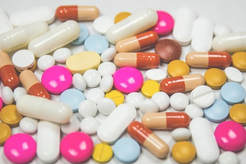Laurie Anne Walden, DVM  Prescription and over-the-counter human medications are the most common toxins that pets ingest, according to the ASPCA Poison Control Center. This article covers some of the over-the-counter products that are hazardous to pets. Pets can be exposed to these products either accidentally or intentionally. Keep all medications and supplements out of your pets’ reach, and never assume that a product that is safe for people is also safe for pets. Dogs and cats process drugs differently from humans. A dose of medication that is OK for a 50-lb child could be very dangerous for a 50-lb dog. Pain relievers Ibuprofen, naproxen, and aspirin are nonsteroidal anti-inflammatory drugs (NSAIDs). Some brand names are Advil, Motrin, and Aleve. In dogs and cats, these drugs can cause digestive tract ulcers, leading to diarrhea, belly pain, and bleeding. NSAIDs can also cause liver and kidney failure at higher doses. Although low doses of aspirin can be used with proper precautions in dogs, ibuprofen and naproxen are not safe for pets. NSAIDs and other pain relievers that are formulated especially for dogs and cats are safer and more effective. Acetaminophen (brand names Tylenol and Excedrin) is highly toxic to cats even in small amounts. It damages cats’ red blood cells and can cause liver failure and death. Dogs are less sensitive than cats to the toxic effects but can also sustain liver damage from acetaminophen. Cold and cough remedies Decongestants like pseudoephedrine (in Sudafed) and phenylephrine (in many oral decongestants and nasal sprays) can cause agitation, hyperactivity, heart rhythm abnormalities, seizures, and death in pets. Some antihistamine products, especially combination or multisymptom products, include decongestants. Always check the active ingredient list before giving any antihistamine to your pet. Other ingredients in decongestant nasal sprays—like oxymetazoline, the active ingredient of Afrin—can cause weakness, collapse, hyperactivity, vomiting, and heart rhythm abnormalities in pets. Pets are usually exposed to this type of product by chewing the bottle. Although the cough suppressant dextromethorphan (in Robitussin and Delsym) can be used in dogs, high doses cause nervous system problems. As with antihistamines, always check the ingredient lists of cough remedies; many include ingredients that are not safe for pets. Eye drops Tetrahydrozoline, the active ingredient of Visine, is in the same drug class as oxymetazoline and causes similar symptoms in pets. Vitamins and iron supplements Flavored chewable vitamins may be attractive to dogs. High doses of vitamin D can cause kidney failure. Very high doses of vitamin A can also cause serious problems in pets. Iron toxicosis can cause digestive tract ulcers, bleeding, liver damage, and seizures. Chewable vitamins may also contain xylitol, an artificial sweetener. Dogs that ingest xylitol can develop low blood sugar levels and liver failure. Topical products Zinc oxide, an ingredient in some sunscreens and other skin creams, causes vomiting and diarrhea if swallowed. Herbal supplements and essential oils The dietary supplement 5-hydroxytryptophan (5-HTP; Griffonia seed extract) can have serious effects on the digestive system, nervous system, heart, and lungs in dogs and cats. Vomiting, diarrhea, seizures, and death can result. Herbal supplements marketed for weight loss and energy may include guarana, which contains caffeine, and ma huang, a source of ephedrine. Dogs that accidentally ingest these products can develop hyperactivity, seizures, and heart rhythm abnormalities. Death is possible at high doses. Peppermint oil is toxic to cats, potentially causing digestive tract, nervous system, and liver problems. Tea tree oil, even small amounts applied to the skin, can be toxic to dogs and cats (cats are more susceptible than dogs). Exposure can cause tremors, coma, and liver damage. Nicotine Nicotine in cigarettes, e-cigarette cartridges, nicotine patches, and nicotine gum is toxic to pets that ingest these products. Nicotine toxicosis can cause vomiting, seizures, and death. For more information about pet poisonings ASPCA Animal Poison Control Pet Poison Helpline Sources: Khan SA. Toxicities from over-the-counter drugs. Merck Veterinary Manual website. Accessed November 26, 2017. Patel T, Brutlag A. Drug store toxins in small animals. In: Plumb DC, ed. Plumb’s Veterinary Drug Handbook, 8th ed. Ames, IA: Wiley-Blackwell; 2015:1683-1687. Poisonous household products. ASPCA Animal Poison Control website. Accessed November 26, 2017. Top 10 human medications poisonous to pets. Pet Poison Helpline website. Accessed November 26, 2017. Photo by freestocks.org Comments are closed.
|
AuthorLaurie Anne Walden, DVM Categories
All
Archives
June 2024
The contents of this blog are for information only and should not substitute for advice from a veterinarian who has examined the animal. All blog content is copyrighted by Mallard Creek Animal Hospital and may not be copied, reproduced, transmitted, or distributed without permission.
|
- Home
- About
- Our Services
- Our Team
-
Client Education Center
- AKC: Spaying and Neutering your Puppy
- Animal Poison Control
- ASPCA Poisonous Plants
- AVMA: Spaying and Neutering your pet
- Biting Puppies
- Boarding Your Dog
- Caring for the Senior Cat
- Cats and Claws
- FDA warning - Bone treats
- Force Free Alliance of Charlotte Trainers
- Getting your Cat to the Vet - AAFP
- Holiday Hazards
- How To Feed Cats for Good Health
- How to Get the Most Out of your Annual Exam
- Indoor Cat Initiative - OSU
- Introducing Your Dog to Your Baby
- Moving Your Cat to a New Home
- Muzzle Training
- Osteoarthritis Checklist for Cats
- What To Do When You Find a Stray
- Our Online Store
- Dr. Walden's Blog
- Client Center
- Contact
- Cat Enrichment Month 2024
|
Office Hours
Monday through Friday 7:30 am to 6:00 pm
|
Mallard Creek Animal Hospital
2110 Ben Craig Dr. Suite 100
|
Site powered by Weebly. Managed by IDEXX Laboratories

 RSS Feed
RSS Feed